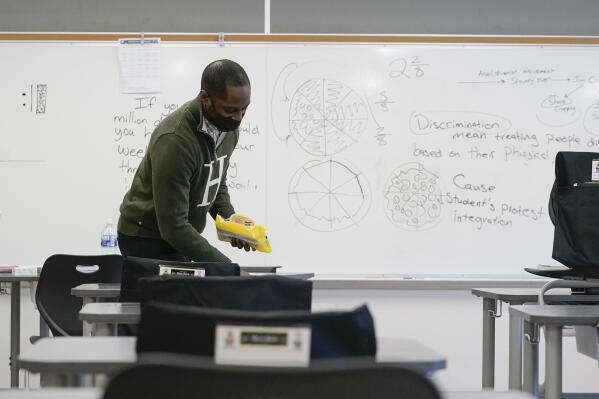Lawmakers consider major changes to Indiana curriculum bill
INDIANAPOLIS (AP) — A contentious Indiana bill that Republican lawmakers say would increase transparency of school curricula could undergo significant changes Wednesday in response to mounting criticism from teachers and education advocates.
Republican bill sponsor Sen. Linda Rogers of Granger on Tuesday announced an amendment that would remove strongly-debated provisions in the bill requiring classroom materials to be posted online and vetted by parent review committees.
Instead, Rogers’ proposal would ensure that parents have access to their school’s learning management system and allow them to review any other learning materials used in their child’s classroom upon request. Parents could request a school board to adopt a parent committee to review curriculum, though it would not be required.
The amendment also strikes language about lawsuits for violations of the bill. It allows parents to appeal to the Indiana Department of Education (IDOE) to take administrative action for a violation if they remain unsatisfied after following the school’s grievance process.
Other provisions in the current bill that would restrict teaching about racism and politics could be removed with the amendment.
Rather than a ban on teaching certain “divisive concepts,” Rogers proposed that schools be barred from teaching that one group is inherently superior or inferior to another, that one group should be treated adversely or preferentially, and that individuals, by virtue of their traits, “are inherently responsible” for the past actions of others who share their traits.
The Senate education committee is slated to take up Rogers’ amendment on Wednesday after the House advanced the measure last month.
Teachers and other critics have argued that the bill, authored by Republican Rep. Tony Cook of Cicero, would amount to “censorship” of classroom instruction and curriculum.
Educators have also expressed concerns about other components of the bill that would limit social and emotional learning (SEL) curriculum that has come under fire from many parents’ groups in the state.
The IDOE defines SEL as a process through which individuals are taught how thoughts, feelings and behaviors are linked, and how learning how to control and reframe thoughts can lead to more positive outcomes.
Three core SEL competencies — regulation, connection and collaboration — are required to be taught to Indiana’s K-12 students, according to the education department’s employability standards. Those competencies center around a student’s ability to recognize and manage emotions, to network with others through social awareness and cultural sensitivity, and to work well with others on a team.
Sarah TeKolste, a high school Spanish teacher at Shortridge High School in Indianapolis, said SEL curriculum helps students understand their emotions and be more empathetic in interactions with their peers. She said the legislation seems to be “exacerbating an existing culture war that is based on misinformation” about SEL.
Isaac Adjei, a fourth grade teacher at Pleasant Run Elementary School in Indianapolis, added that SEL practices are “a key part of what we do” as teachers.
“If we take this away, it makes teaching feel like more of a robotic profession, and I think parents really don’t want that either,” Adjei said. “I think we’re creating legislation with a broad brush for one-off occurrences.”
In Elkhart, Indiana, fifth grade teacher Suzanne Holcomb said SEL has become a “vital piece of learning, especially with everything that kids have gone through with the pandemic.” She noted a “huge uptick” in “violent” student outbursts and fights since resuming in-person instruction.
“I fully believe that our kids are so desperate for these skills, and how to get along and how to communicate, and they have missed so much of that while being quarantined or in e-learning,” Holcomb said.
But some parents argue that SEL is used to control the social and emotional health of students, or as a vehicle for conversations about race and gender identity.
Indiana Attorney General Todd Rokita has doubled down on opponents’ concerns, saying in his parental bill of rights that “SEL programs represent a fundamental shift in the role of teachers from educators to therapists and expand the reach of government into domains of the family.”
The current legislation would limit SEL by requiring schools to get parental permission before administering mental, social-emotional or psychological services to a student, or before asking a student to participate in a “survey, evaluation or personal analysis” that attempts to affect a student’s “attitude, habits, traits, opinions, or beliefs.”
Rogers’ amendment adds language stipulating that parental notice requirements do not apply to daily interactions between school staff and students.
It also shortens the window of time that schools must wait for parental response before beginning ongoing, nonemergency mental health services for a student.
Under the amendment, schools would be required to provide parents with two separate notices, giving them the chance to opt their child out of services. Parents would have seven days to opt their child out of the services if they are contacted electronically and could end services at any time once they begin.
Parental consent would not be required for immediate intervention in emergencies.
The Senate education committee will consider the bill, even after it killed a similar proposal in January.
The decision to abandon the measure came after Republican Sen. Scott Baldwin of Noblesville said maintaining neutrality on contentious issues required teachers to be “impartial” when discussing Nazism and other political ideologies.
Following widespread criticism, Baldwin walked back the comments, saying in a statement that he “unequivocally” condemns Nazism, fascism and Marxism and agrees that teachers should do the same.
___
Casey Smith is a corps member for the Associated Press/Report for America Statehouse News Initiative. Report for America is a nonprofit national service program that places journalists in local newsrooms to report on undercovered issues. Follow Smith on Twitter.




